“Until recently, Julio Noguera worked at a bakery. But he now spends his evenings searching through the garbage for food. “I come here looking for food because if I didn't, I'd starve to death”, Noguera said as he sorted through a pile of moldy potatoes. “With things like they are, no one helps anyone and no one gives away meals”. Across town, unemployed people converge every dusk at a trash heap on a downtown Caracas sidewalk to pick through rotten fruit and vegetables tossed out by nearby shops. They are frequently joined by small business owners, college students and pensioners – people who consider themselves middle class even though their living standards have long ago been pulverized by triple-digit inflation, food shortages and a collapsing currency. Venezuela's poverty had eased during the administration of the late President Hugo Chavez. But a study by three leading Caracas universities found that 76 percent of Venezuelans are now under the poverty line, compared with 52 percent in 2014.
Staples such as corn flour and cooking oil are subsidized, costing pennies at the strongest of two official exchange rates. But fruit and vegetables have become an unaffordable luxury for many Venezuelan families. “We're seeing terrible sacrifices across many sections of society”, said Carlos Aponte, a sociology professor at the Central University of Venezuela. “A few years ago, Venezuela didn't have the kind of extreme poverty that would drive people to eat garbage”. Dumpster diving isn't a new phenomenon in Venezuela, but it is a growing one. Venezuela was once the richest nation in South America, but a fall in oil prices combined with other economic problems has sparked desperation. Nearly half of Venezuelans say they can no longer afford to eat three meals a day, according to a recent poll by the local firm Venebarometro. The poll surveyed 1,200 adults at their homes the first week in April and had a margin of error of plus or minus of about 2 percentage points. The government blames the political opposition, accusing it of waging an "economic war" to stir unrest and oust President Nicolas Maduro from power. The administration has launched an aggressive program to build urban farms in an effort to address food shortages”. – Fabiola Sanchez via The Associated Press
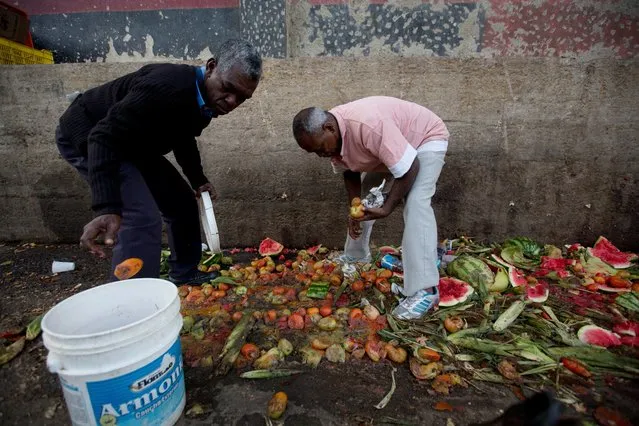
In this May 31, 2016 photo, Pedro Hernandez, left, and his friend Luis Daza, pick up tomatoes from the trash area of the Coche public market in Caracas, Venezuela. At Coche, even once middle class Venezuelans made desperate by the country's economic collapse have taken to sifting through the trash to resell or feed themselves on discarded fruits and vegetables. (Photo by Fernando Llano/AP Photo)
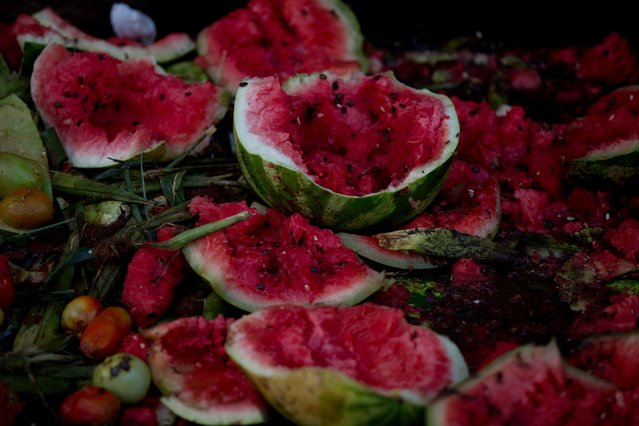
In this May 31, 2016 photo, pieces of watermelon litter the trash area of the Coche public market in Caracas, Venezuela. Staples such as corn flour and cooking oil are subsidized, costing pennies at the strongest of two official exchange rates. But fruit and vegetables have become an unaffordable luxury for many Venezuelan families. (Photo by Fernando Llano/AP Photo)
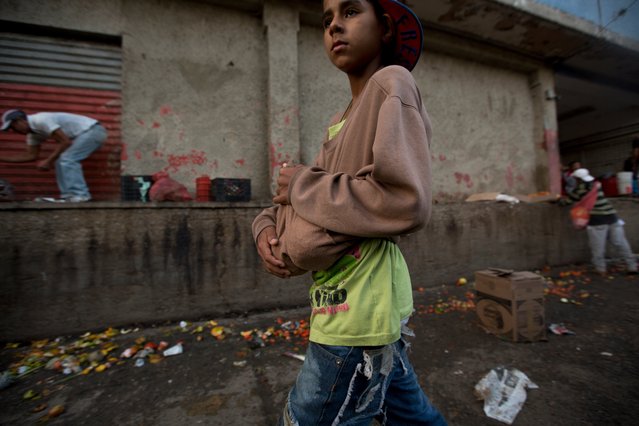
In this June 3, 2016 photo, a boy carries two pineapples he found in the trash area of the Coche public market in Caracas, Venezuela. Staples such as corn flour and cooking oil are subsidized, costing pennies at the strongest of two official exchange rates. But fruit and vegetables have become an unaffordable luxury for many Venezuelan families. (Photo by Fernando Llano/AP Photo)
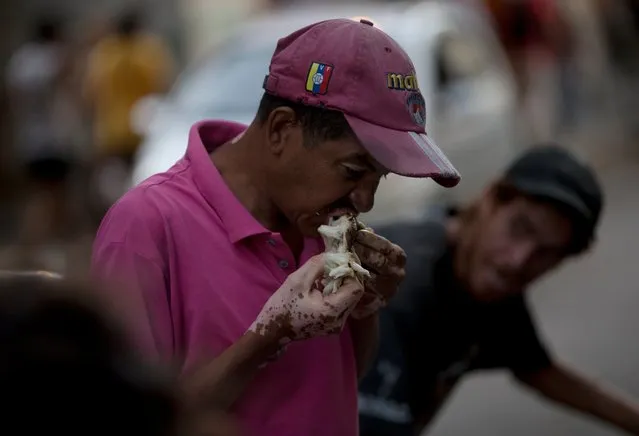
In this June 2, 2016 photo, a man eats a guanabana he found in a garbage bag outside a supermarket in downtown Caracas, Venezuela. People who consider themselves middle class even though their living standards have long ago been pulverized by triple-digit inflation, food shortages and a collapsing currency converge on the Caracas sidewalk to pick through rotten fruit and vegetables tossed out by nearby shops. (Photo by Fernando Llano/AP Photo)
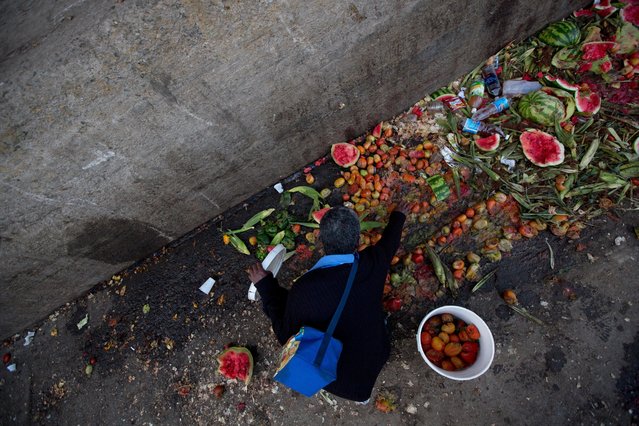
In this May 31, 2016 photo, Pedro Hernandez culls through discarded tomatoes from the trash area of the Coche public market in Caracas, Venezuela. At Coche, even once middle class Venezuelans made desperate by the country's economic collapse have taken to sifting through the trash to resell or feed themselves on discarded fruits and vegetables. (Photo by Fernando Llano/AP Photo)
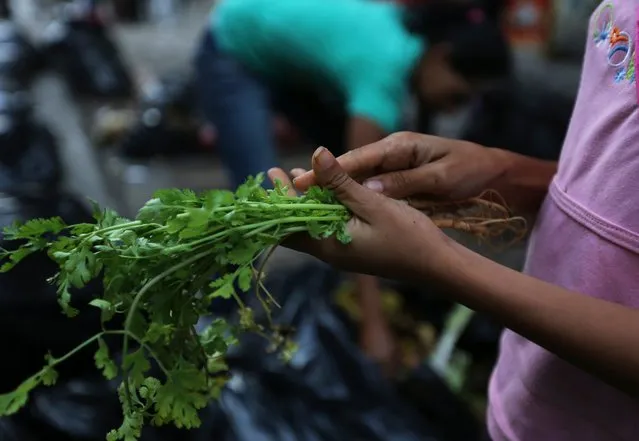
In this June 2, 2016 photo, a teenage girl cleans up discarded cilantro stalks collected from garbage bags outside a supermarket in downtown Caracas, Venezuela. While some search through the garbage piles for food they can eat, many more are drawn by the opportunity to fetch a few bolivar bills by rescuing and reselling bruised produce. (Photo by Fernando Llano/AP Photo)
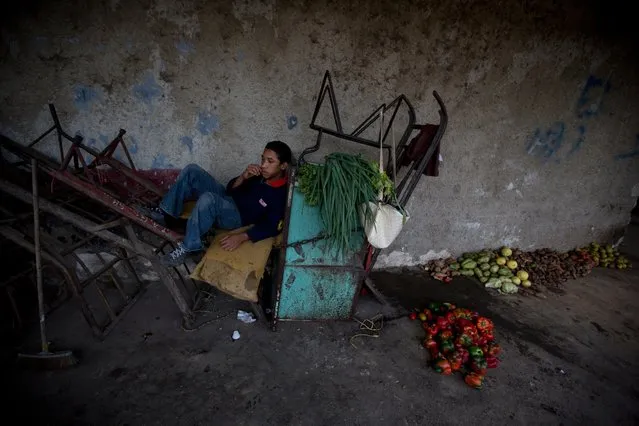
In this May 31, 2016 photo, Antonio Gutierrez who works driving a cart rests next to vegetables and fruits he and a friend collected from the trash of the Coche public market in Caracas, Venezuela. While some search through the garbage piles for food they can eat, many more are drawn by the opportunity to fetch a few bolivar bills by rescuing and reselling bruised produce. (Photo by Fernando Llano/AP Photo)
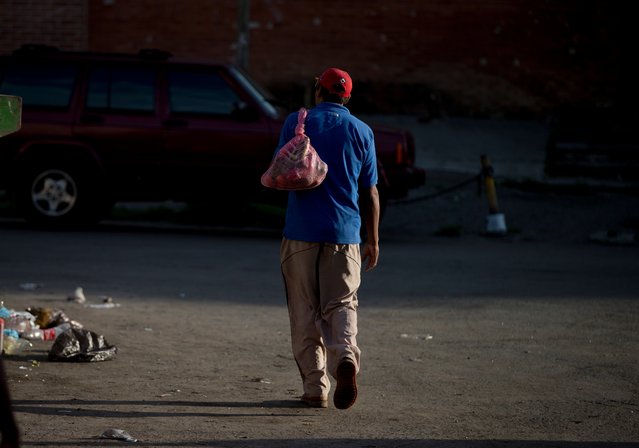
In this May 31, 2016 photo, Julio Noguera leaves the Coche public market after collecting discarded vegetables from the trash area in Caracas, Venezuela. Until recently, Noguera worked at a bakery. But he now spends his evenings searching through the garbage for food. (Photo by Fernando Llano/AP Photo)
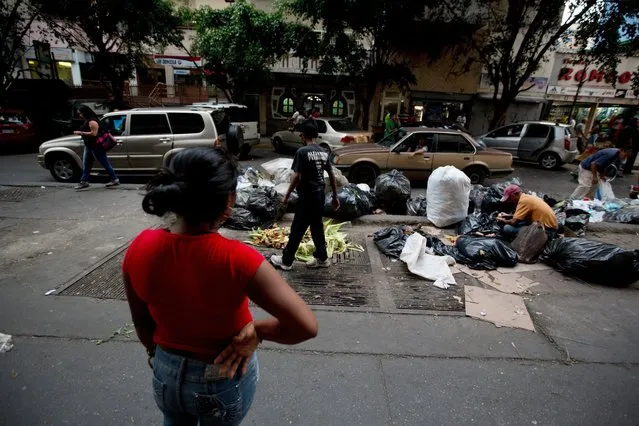
In this May 31, 2016 photo, a young man rummages through a pile of supermarket garbage bags looking for food at downtown Caracas, Venezuela. Unemployed people converge every dusk at the trash heap to pick through rotten fruit and vegetables tossed out by nearby shops. (Photo by Fernando Llano/AP Photo)
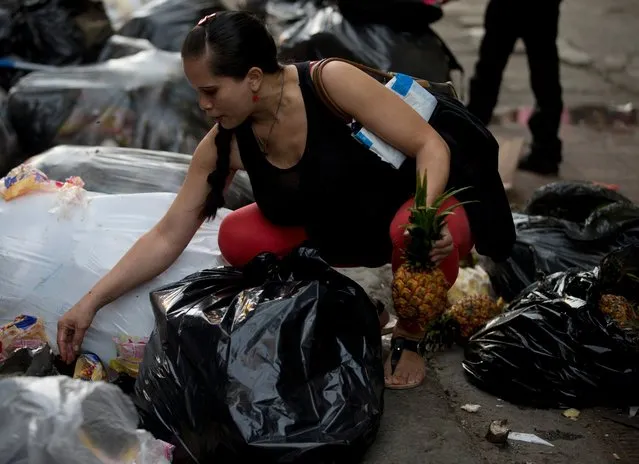
This June 2, 2016 photo shows a pregnant woman who did not want to be named, holding a pineapple in one hand as she continues to pick through garbage bags outside a supermarket in downtown Caracas, Venezuela. Unemployed people converge every dusk at the trash heap to pick through rotten fruit and vegetables tossed out by nearby shops. (Photo by Fernando Llano/AP Photo)
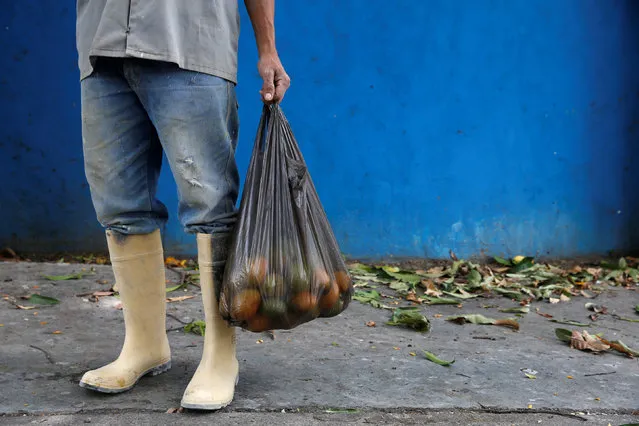
A worker holds a bag filled with mangoes after plucking them from a tree in Caracas, Venezuela, June 6, 2016. (Photo by Carlos Garcia Rawlins/Reuters)

A girl eats a tropical fruit called “Mamon” while seated next to some mangoes on a street in La Fria, Venezuela, June 2, 2016. (Photo by Carlos Garcia Rawlins/Reuters)
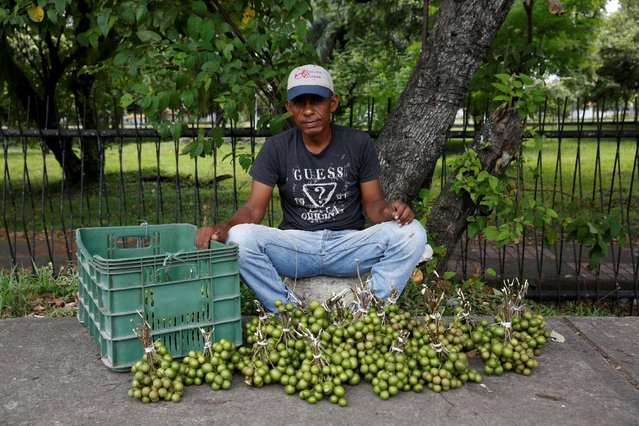
Orlando Holguin poses for a picture next to tropical fruits called “Mamones” at his street stall in La Fria, Venezuela, June 2, 2016. (Photo by Carlos Garcia Rawlins/Reuters)
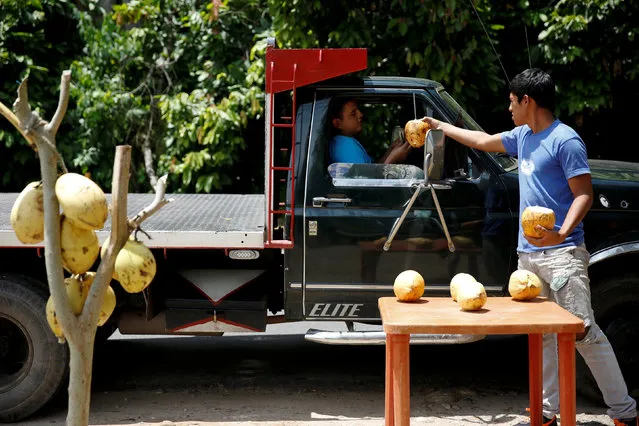
Josue Moreno, 19, gives a coconut to a customer at his street stall in La Fria, Venezuela, June 2, 2016. (Photo by Carlos Garcia Rawlins/Reuters)
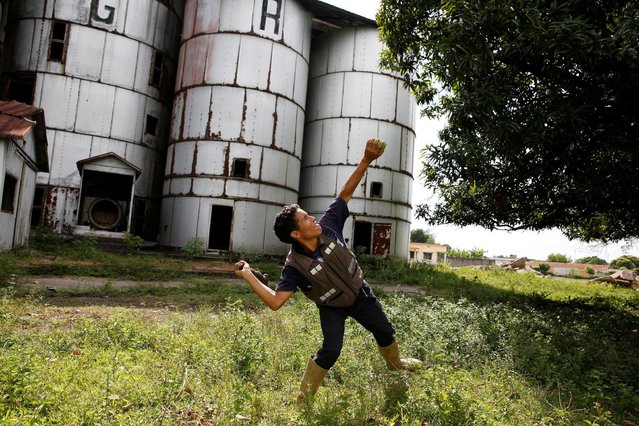
Josue Moreno, 14, throws a stick towards a mango tree as he tries to dislodge the fruits in La Fria, Venezuela, June 2, 2016. (Photo by Carlos Garcia Rawlins/Reuters)
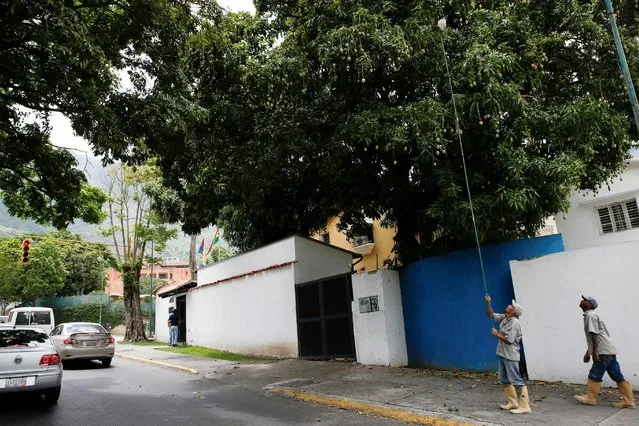
A worker uses a plastic container tied to a stick to dislodge mangoes from a tree in Caracas, Venezuela, June 6, 2016. (Photo by Carlos Garcia Rawlins/Reuters)
Staples such as corn flour and cooking oil are subsidized, costing pennies at the strongest of two official exchange rates. But fruit and vegetables have become an unaffordable luxury for many Venezuelan families. “We're seeing terrible sacrifices across many sections of society”, said Carlos Aponte, a sociology professor at the Central University of Venezuela. “A few years ago, Venezuela didn't have the kind of extreme poverty that would drive people to eat garbage”. Dumpster diving isn't a new phenomenon in Venezuela, but it is a growing one. Venezuela was once the richest nation in South America, but a fall in oil prices combined with other economic problems has sparked desperation. Nearly half of Venezuelans say they can no longer afford to eat three meals a day, according to a recent poll by the local firm Venebarometro. The poll surveyed 1,200 adults at their homes the first week in April and had a margin of error of plus or minus of about 2 percentage points. The government blames the political opposition, accusing it of waging an "economic war" to stir unrest and oust President Nicolas Maduro from power. The administration has launched an aggressive program to build urban farms in an effort to address food shortages”. – Fabiola Sanchez via The Associated Press

In this May 31, 2016 photo, Pedro Hernandez, left, and his friend Luis Daza, pick up tomatoes from the trash area of the Coche public market in Caracas, Venezuela. At Coche, even once middle class Venezuelans made desperate by the country's economic collapse have taken to sifting through the trash to resell or feed themselves on discarded fruits and vegetables. (Photo by Fernando Llano/AP Photo)

In this May 31, 2016 photo, pieces of watermelon litter the trash area of the Coche public market in Caracas, Venezuela. Staples such as corn flour and cooking oil are subsidized, costing pennies at the strongest of two official exchange rates. But fruit and vegetables have become an unaffordable luxury for many Venezuelan families. (Photo by Fernando Llano/AP Photo)

In this June 3, 2016 photo, a boy carries two pineapples he found in the trash area of the Coche public market in Caracas, Venezuela. Staples such as corn flour and cooking oil are subsidized, costing pennies at the strongest of two official exchange rates. But fruit and vegetables have become an unaffordable luxury for many Venezuelan families. (Photo by Fernando Llano/AP Photo)

In this June 2, 2016 photo, a man eats a guanabana he found in a garbage bag outside a supermarket in downtown Caracas, Venezuela. People who consider themselves middle class even though their living standards have long ago been pulverized by triple-digit inflation, food shortages and a collapsing currency converge on the Caracas sidewalk to pick through rotten fruit and vegetables tossed out by nearby shops. (Photo by Fernando Llano/AP Photo)

In this May 31, 2016 photo, Pedro Hernandez culls through discarded tomatoes from the trash area of the Coche public market in Caracas, Venezuela. At Coche, even once middle class Venezuelans made desperate by the country's economic collapse have taken to sifting through the trash to resell or feed themselves on discarded fruits and vegetables. (Photo by Fernando Llano/AP Photo)

In this June 2, 2016 photo, a teenage girl cleans up discarded cilantro stalks collected from garbage bags outside a supermarket in downtown Caracas, Venezuela. While some search through the garbage piles for food they can eat, many more are drawn by the opportunity to fetch a few bolivar bills by rescuing and reselling bruised produce. (Photo by Fernando Llano/AP Photo)

In this May 31, 2016 photo, Antonio Gutierrez who works driving a cart rests next to vegetables and fruits he and a friend collected from the trash of the Coche public market in Caracas, Venezuela. While some search through the garbage piles for food they can eat, many more are drawn by the opportunity to fetch a few bolivar bills by rescuing and reselling bruised produce. (Photo by Fernando Llano/AP Photo)

In this May 31, 2016 photo, Julio Noguera leaves the Coche public market after collecting discarded vegetables from the trash area in Caracas, Venezuela. Until recently, Noguera worked at a bakery. But he now spends his evenings searching through the garbage for food. (Photo by Fernando Llano/AP Photo)

In this May 31, 2016 photo, a young man rummages through a pile of supermarket garbage bags looking for food at downtown Caracas, Venezuela. Unemployed people converge every dusk at the trash heap to pick through rotten fruit and vegetables tossed out by nearby shops. (Photo by Fernando Llano/AP Photo)

This June 2, 2016 photo shows a pregnant woman who did not want to be named, holding a pineapple in one hand as she continues to pick through garbage bags outside a supermarket in downtown Caracas, Venezuela. Unemployed people converge every dusk at the trash heap to pick through rotten fruit and vegetables tossed out by nearby shops. (Photo by Fernando Llano/AP Photo)

A worker holds a bag filled with mangoes after plucking them from a tree in Caracas, Venezuela, June 6, 2016. (Photo by Carlos Garcia Rawlins/Reuters)

A girl eats a tropical fruit called “Mamon” while seated next to some mangoes on a street in La Fria, Venezuela, June 2, 2016. (Photo by Carlos Garcia Rawlins/Reuters)

Orlando Holguin poses for a picture next to tropical fruits called “Mamones” at his street stall in La Fria, Venezuela, June 2, 2016. (Photo by Carlos Garcia Rawlins/Reuters)

Josue Moreno, 19, gives a coconut to a customer at his street stall in La Fria, Venezuela, June 2, 2016. (Photo by Carlos Garcia Rawlins/Reuters)

Josue Moreno, 14, throws a stick towards a mango tree as he tries to dislodge the fruits in La Fria, Venezuela, June 2, 2016. (Photo by Carlos Garcia Rawlins/Reuters)

A worker uses a plastic container tied to a stick to dislodge mangoes from a tree in Caracas, Venezuela, June 6, 2016. (Photo by Carlos Garcia Rawlins/Reuters)
08 Jun 2016 10:21:00,
post received
0 comments
